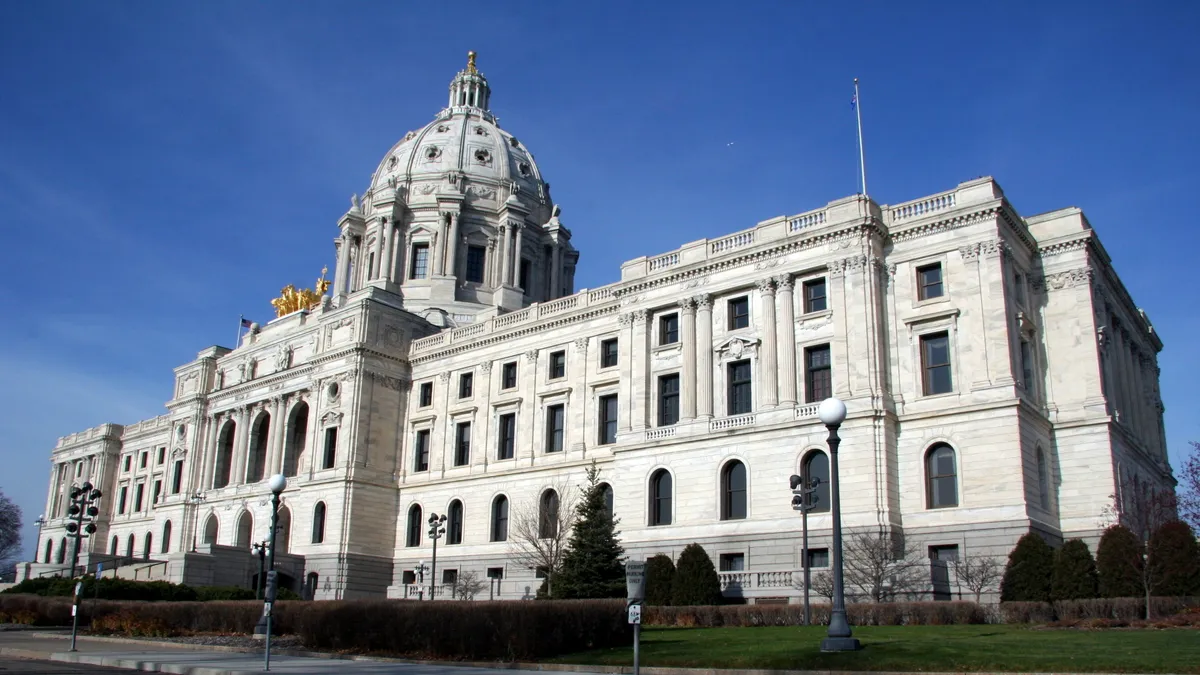A budget bill with groundbreaking and contentious utility provisions was vetoed by Minnesota Governor Mark Dayton (D) after being pushed through the lower house in a midnight rush. The veto set up a one-day special session and a flurry of deal-making.
If it had been signed into law, HF 1437, an omnibus jobs, housing, economic development, and energy appropriations bill, would have allowed Xcel Energy to realize many of the goals of a statewide utility modernization initiative by filing a multi-year rate plan with state regulators and requesting remuneration based on meeting specified performance metrics.
It would have also allowed electric cooperatives and municipal utilities to add monthly fixed charges to the bills of customers with on-site net metered distributed energy resources.
The bill “insufficiently funds” several agencies, and “contains changes to Minnesota’s net metering laws that will disincentivize the use of wind and solar power,” Governor Dayton wrote in his veto letter to the legislature.
The legislative special session is expected in mid-June after key players haggle out a compromise on the bill’s controversial points. The deal that emerges will determine whether Minnesota’s co-ops and munis are pushed to follow Xcel Energy toward innovative rate structures or supported in their own push to use monthly bill fees to control distributed generation on their systems.
“I have not heard yet what is in and what is out,” said Minnesota Rural Electric Association Director of Government Affairs and Counsel Jim Horan. “It is important that the governor mentioned the change in net metering for co-ops and munis. We were disappointed to see it mentioned that way.”
Performance-based multi-year rates
“The multi-year rate plan received bi-partisan legislative support and we expect that this important initiative will remain in the bill through the special session,” reported Chris Clark, President of Xcel’s Minnesota subsidiary Northern States Power.
A multi-year rate plan is one of the key planks of Minnesota’s groundbreaking e21 (21st Century Energy System) Initiative. It is intended to help utilities move to a new business model through two fundamental shifts:
- The shift from providing all customers with grid electricity produced primarily with coal, natural gas, or nuclear power at large central stations to providing them with a full spectrum of energy resources and options for when and how cutomers want to use them
- The shift from dependence on returns from new central generation and escalating rates to meeting publicly preset performance metrics for energy efficiency, reliability, affordability, emissions reductions, predictable rates, and other goals that add wider benefits.
The performance-based approach to ratemaking and incentives proposed by HF 1437 follows the e21 concept in allowing state regulators to approve a multi-year rate plan based on the utility’s long term investment projections, and a utility-proposed reasonable capital cost recovery plan. Regulators would also be able to approve a utility-proposed set of reasonable performance measures and incentives that are “quantifiable, verifiable, and consistent with state energy policies.”
To allow for oversight of utilities with such long term authorization, the bill also establishes the Minnesota Public Utilities Commission’s privilege to establish “reasonable and prudent costs of service … and ensure that rates remain just and reasonable." It would allow the PUC to review and extend the plan if necessary, and “initiate a proceeding to determine a set of performance measures that can be used to assess a utility operating under a multiyear plan.”
Distributed generation, net metering, co-ops, and munis
“The Xcel multi-year rate was non-controversial. It passed both bodies and Xcel backed it. It was not cited by the governor in his veto letter,” said Allen Gleckner, senior policy associate at Fresh Energy, a Minnesota-based clean energy advocacy group. "But his veto letter did say the rollback of net metering disincentivizes solar and wind. He called it out specifically. That puts him face to face with the co-ops and munis.”
In a special session, the failure to approve a budget could shut the state government down, Gleckner explained.
“The Governor and leadership could easily decide to get the deal done by stripping out controversial issues like the net metering policy,” he said.
But, Gleckner added, the coops and munis have been lobbying hard for it throughout the session and count powerful rural legislators among their allies.
“If Senate leadership wants it enough, they could give up budget items to keep [the net metering changes]," he said. "The only concrete thing right now is that it was included in the veto letter.”
In a provision long lobbied for, the bill changes Minnesota law preventing discrimination against solar owners with special fixed monthly charges. But, it also allows co-ops and munis to “charge an additional fee to recover the fixed costs not already paid for by the customer through the customer’s existing billing arrangement.”
The bill specifies the charge on net metered distributed generation must be “reasonable and appropriate… [and] based on the most recent cost of service study.” It also requires that study to be publicly available. In a potential departure from the custom of allowing co-ops and munis to self-regulate, the bill also authorizes the commission to ensure the fixed charges are “not discriminatory.”
Rate design is complicated, Horan said.
“Customers with distributed generation use the system as a back-up battery and to sell back power. That imposes costs on the utility in terms of metering and billing and interconnection costs and other on-going costs," he said. "This is not a punitive fee. We are looking for a formula to collect some of the fixed costs needed to serve that member.”
The impact of a fixed fee will be managed by regulators’ oversight, he told Utiltiy Dive.
“This allows net metering to continue and allows co-ops to continue to support net metering and distributed generation and allows distributed generation to grow in the state," he said. "It protects electric co-ops and protects their members from the cost shift and prevents one neighbor from subsidizing another, but still allows distributed generation to grow.”
How to respond to distributed generation growth?
“The co-op provision basically says we don’t know how to deal with distributed generation or accommodate it or value it so we will just slap an additional charge on their bills,” explained John Farrell, a director at the Institute for Local Self-Reliance and author of studies on the value of solar and the "Utility 2.0" business model.
“The vision behind e21 is that we align the intentions of a profit making company with the social interests. The bill is trying to align the utility’s incentives with a more renewable and efficient future,” he said. “The co-ops and munis are saying they are not willing to look at how distributed generation fits into the bigger picture of electricity supply and demand on a 21st century grid.”
Co-ops were formed in the 1930s because they realized that if they didn’t bring electricity to rural regions, nobody would. But now, Farrell echoed what Mark Vogt, CEO of the Minnesota co-op Wright-Hennepin recently told Utility Dive about his co-op’s solar program, saying that "they know if they don't do it, someone else will.”
There are a lot of distributed generation providers, Farrell said. “Will the co-ops response to that be the 20th century clamp-down with fixed charges? Or will they embrace distributed generation?”
Distributed generation has definite value to the system, Horan said, and co-ops are engaged in understanding what that value is.
The politics of the proposal
As to the fate of the bill, Horan could only say there is “a lot of wrangling going on.”
“I’m always amazed at the political influence of the co-ops and munis,” Farrell said, noting they get the attention of rural legislators because their boards are the most influential people in their communities.
Watch Senate Majority Leader Tom Bakk, a Democrat from the Iron Range, Gleckner said.
“He is not prejudiced for or against renewables and is very transactional, but his son is a co-op leader,” he explained.
Bakk wants a provision allowing two Iron Range utilities to offer reduced electricity rates to “energy intensive trade exposed industries” and might be willing to give up something to get that, Gleckner explained. The Governor might take that deal if Iron Range legislators want to risk other ratepayers' ire.






















